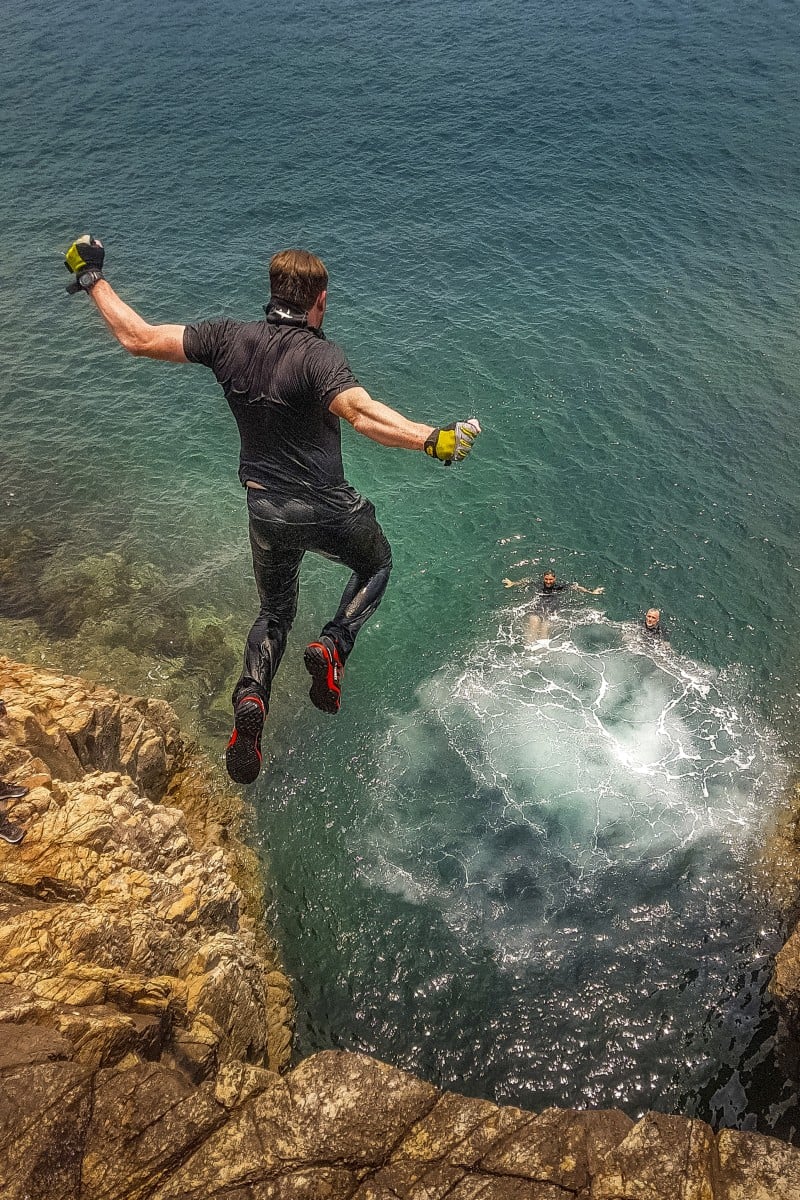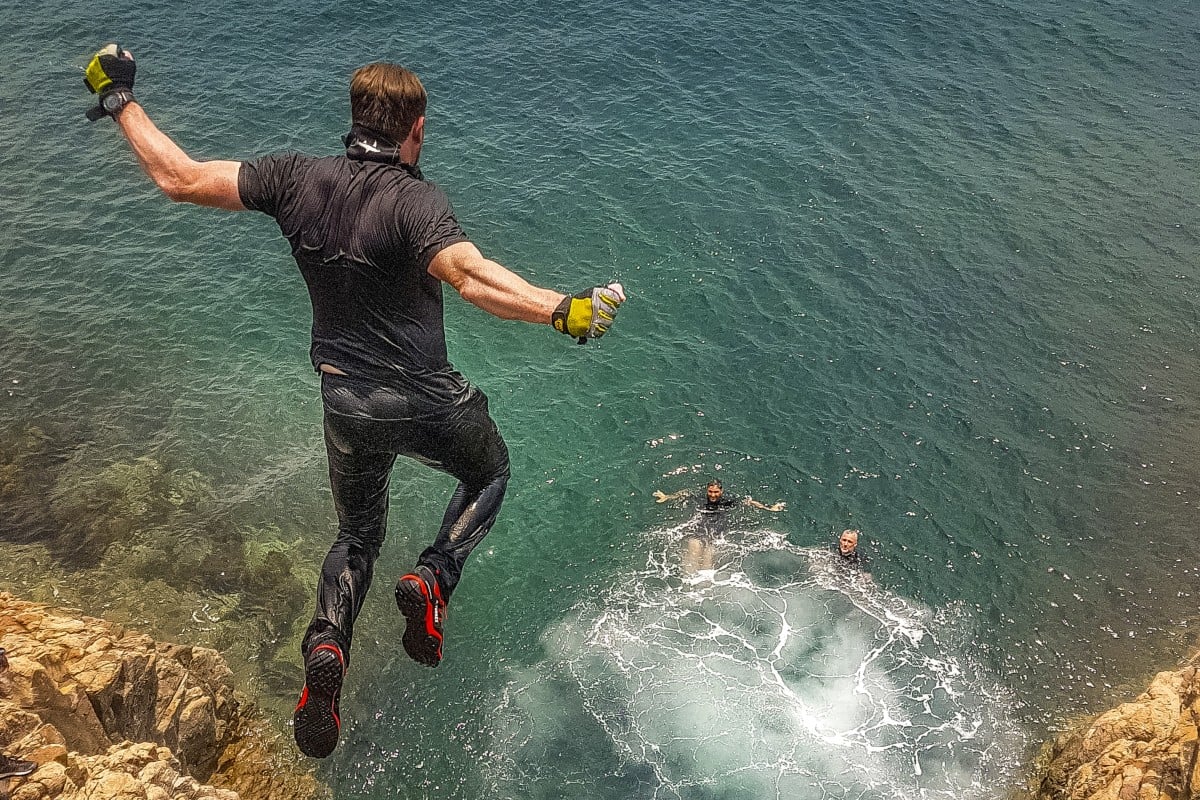
Study Buddy (Challenger): Why adrenaline junkies and sensation seekers are always looking for new thrills
- Psychologist says these people enjoy new experiences and are easily bored
- This page is for students who want to take their reading comprehension to the next level with difficult vocabulary and questions to test their inference skills
 Roland Sharman has found empowering in facing his fear of heights. Photo: Iurgi/HK Outdoor Adventures
Roland Sharman has found empowering in facing his fear of heights. Photo: Iurgi/HK Outdoor AdventuresContent provided by the British Council
Read the following text, and answer questions 1-9 below:
[1] When Roland Sharman sees a cliff, he likes to jump off it or scale it, which is unusual behaviour since he is scared of heights. But facing his fear was the best way to conquer it.
[2] “That fear is what introduced me to ‘vertical adventure’,” said Sharman, referring to rock climbing, canyoning and mountaineering – “activities that focus on climbing up or abseiling down from a height. I realised that to find a path of empowerment, I would have to face my fear head on.”
[3] Sharman is the founder of HKOutsider, a community of people who love adventure activities, including his favourites: canyoning, coasteering and climbing. “They all get the adrenaline flowing,” he said. The 53-year-old Briton is part of a growing global movement of thrill seekers. “Adventure is cool and very much part of popular culture.”
[4] But what makes some people adrenaline junkies, while others are content with a leisurely stroll along a beach? Hong Kong-based psychologist Katrina Rozga said it described people who enjoy seeking new experiences and are easily bored.
[5] “Sensation seekers tend to be attracted to complex, novel and intense sensations, and often take risks to experience [them],” Rozga explained.
[6] She pointed to research about the brains of people with high scores on the Sensation Seeking Scale – a 40-question test created in 1964 by US psychologist Marvin Zuckerman. The study found that these people tended to release more dopamine, the brain’s feel-good chemical, than those who were classified as low sensation seekers. Most of these high sensation seekers also released less norepinephrine, a chemical in your body that helps you stay focused.
[7] “This is because sensation seekers have lower levels of monoamine oxidase enzymes, which regulate neurotransmitters, including dopamine, which make an experience a positive and enjoyable one. This can drive the person to repeat the sensation and seek out more new and exciting experiences,” Rozga said.
[8] Sensation seeking is often linked to risky behaviour, but Rozga said these were separate. “Sensation seekers are looking for novel and exciting experiences which can, at times, lead to danger,” she said. But according to the psychologist, those who want to take more risks often enjoy the danger, not how new and fun the experience could be.
[9] Sharman has his own explanations for why people like adrenaline-pumping adventure. “Once you get comfortable with embracing vulnerability and expanding your comfort zone, it becomes incredibly addictive,” he said. But he added that these experiences also have a positive impact on personal growth.
[10] “It’s not just about the act but the journey from the physical to the emotional, interacting with the environment and truly living in the moment,” he said. “This makes you stronger and more resilient.” Whether you enjoy relaxing with a book or jumping off cliffs, Sharman thinks we are all looking to feel better physically and mentally.
Source: South China Morning Post, August 26
Questions
1. What does the “unusual behaviour” in paragraph 1 refer to?
2. What do the physical activities mentioned in paragraph 2 have in common?
3. Find a word in paragraph 3 that refers to “a substance produced in the body when someone is excited”.
4. According to paragraph 4, which of the following activities is least likely to be appealing to an adrenaline junkie?
A. skydiving
B. brisk walking
C. bungee jumping
D. white-water rafting
5. Based on your understanding of paragraph 5, sensation seekers are more likely to ...
A. enjoy roller coasters and other thrill rides.
B. try new foods and travel to new places.
C. take challenging risks to advance their careers.
D. all of the above
6. What is the conclusion of the study mentioned in paragraph 6?
7. In paragraph 7, there is a relationship between someone’s levels of monoamine oxidase enzymes and their tendency to seek sensation.
A. indirect
B. inverse
C. parallel
D. positive
8. What is one potential downside of being a thrill seeker, according to paragraph 8?
9. Which of the following is an alternative headline for this article?
A. Adrenaline junkies: what makes them tick?
B. The thrill of the risk: what drives people to seek out danger?
C. The science of sensation seeking: why some people love to live on the edge
D. all of the above
Answers
1. It refers to Roland Sharman jumping off or scaling a cliff even though he is afraid of heights.
2. They focus on climbing up, or abseiling down from, a height. / They are “vertical adventures”. (any one)
3. adrenaline
4. B
5. D
6. People who score high on the sensation seeking scale tend to release more dopamine and less norepinephrine than those classified as low sensation seekers.
7. B
8. These new and exciting experiences can, at times, lead to danger.
9. D
